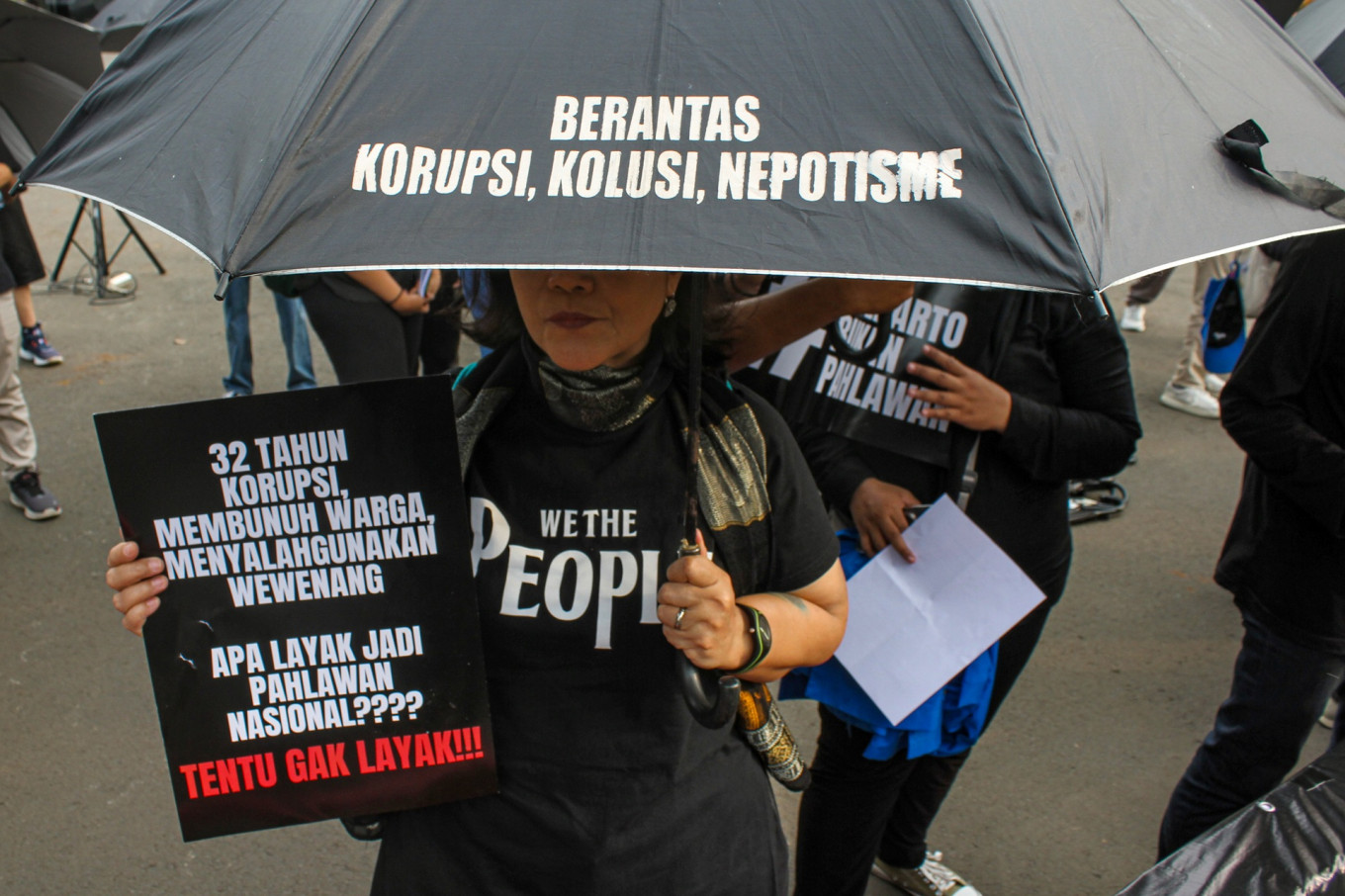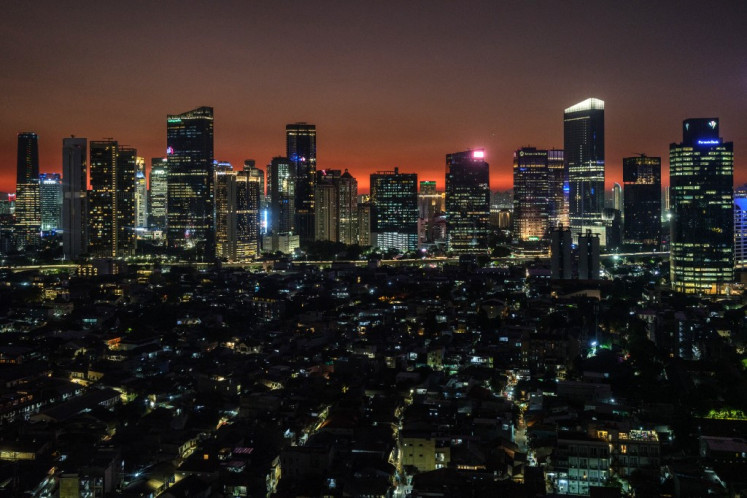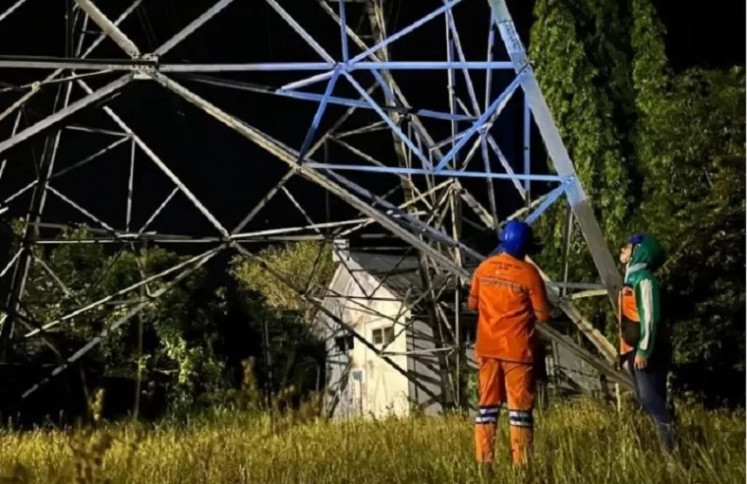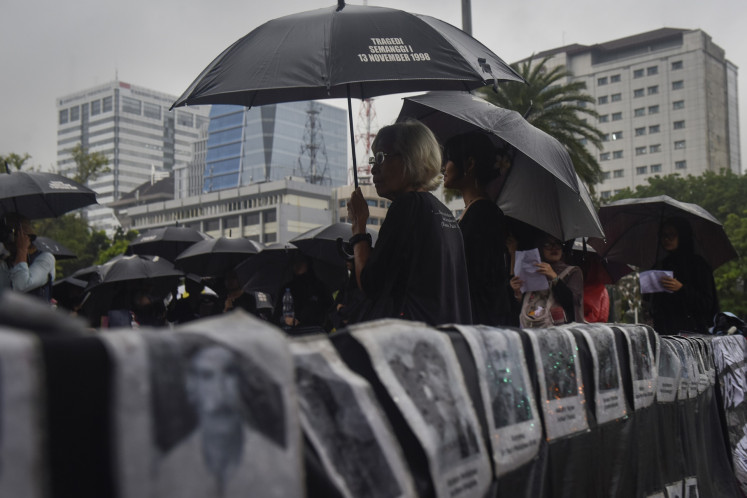Popular Reads
Top Results
Can't find what you're looking for?
View all search resultsPopular Reads
Top Results
Can't find what you're looking for?
View all search resultsAsia: From democracy's hope to repression's leader
Despite denials and official rebukes, ample evidence suggests that India and China, despite their differences, have adopted the same philosophy in tackling borderless repression.
Change text size
Gift Premium Articles
to Anyone
 Activists from the Solidarity Network for Victims and Justice (JSKK) hold posters during the 861st Kamisan (Thursday) peaceful protest in front of the State Palace in Jakarta on May 15. The protests call on the Attorney General's Office to take concrete action on unresolved human rights violations that occurred in May 1998. (Antara/Fathul Habib Sholeh)
Activists from the Solidarity Network for Victims and Justice (JSKK) hold posters during the 861st Kamisan (Thursday) peaceful protest in front of the State Palace in Jakarta on May 15. The protests call on the Attorney General's Office to take concrete action on unresolved human rights violations that occurred in May 1998. (Antara/Fathul Habib Sholeh)
Hopes abounded that Asia could one day become a beacon of democracy, but it is instead transforming into a leader in repression.
While I acknowledge the continent's immense size and diversity, necessitating a refrain from broad generalizations, Asia’s two largest nations, China and India, demonstrate ruthless efficiency in squashing dissent, even beyond their borders. For them, the ends consistently justify the means, especially when targeting those who dare to criticize.
The International Consortium of Investigative Journalists, a Washington D.C. non-profit, recently published a major investigation detailing how Chinese security agencies systematically attempt to dismantle overseas dissent. "China Targets", released in late April, is a damning report for Beijing, analyzing how its security apparatus intimidates and represses critics.
Similarly, India is proving its capability in punishing, and even eliminating, exiled members of the Sikh community who aspire to carve out a separate nation in their homeland. In-depth investigations have been conducted in both Canada and the United States following a series of incidents.
Why two of the world's most prominent nations pursue such policies remains perplexing. Both are still emerging, yet have largely established themselves as superpowers. They are respected promoters of the Global South, serving as role models for other developing peers. Both contribute positively through their efforts in international cooperation and development, something I witness firsthand from Nepal.
Is it insecurity that propels Beijing and Delhi toward these policies? Despite denials and official rebukes, ample evidence suggests that India and China, despite their differences, have adopted the same philosophy in tackling borderless repression. Perhaps we should be more shocked that India employs such tactics.
Prime Minister Narendra Modi of India just visited Accra, where he addressed the Parliament. He spoke of his nation's significant progress under his leadership and highlighted India's established partnership with Africa, including its investments and financial aid. These are highly positive factors that enable and strengthen South-South cooperation, and Delhi can indeed play a substantial role in elevating Africa’s global profile.
Yet, in that same Parliament, Modi also boasted about his country's democratic credentials. While India is undoubtedly a democracy, its credentials are eroding as the nation, under PM Modi’s BJP, pursues its development trajectory at the expense of upholding important aspects of its democratic fabric.
"India is often called the mother of democracy. For us, democracy is not merely a system of governance, it is a way of life, deeply rooted in our fundamental values. For thousands of years, we have upheld democratic principles," he asserted before Parliament. Much in India is admirable, but it is deeply concerning that its democracy is increasingly becoming an exercise in top-down majoritarianism.
Turning to China, we know it operates as a one-party system, and President Xi Jinping possesses a unique ability to silence those who think differently. China’s tactics abroad must be condemned, these methods, as recently learned, are not exclusively applied to members of its diaspora. Reports indicated that China attempted to disrupt Taiwan’s Vice President Hsiao Bi-khim’s visit to the Czech Republic last year, which is both stunning and shocking.
While China has the right to pursue its policy of unification with Taiwan, I cannot comprehend why Chinese policymakers are so obsessed with the threat of using force to take over the island. The more they adopt aggressive postures in the Straits and the South China Sea, the more they will turn the international community against them. I am imploring ASEAN leaders to do whatever it takes to dissuade Beijing from making a tragic and bloody mistake.
In fairness, however, simply focusing on India and China while pretending everything is fine back home would be too convenient for me. This situation provides an opportunity to express my strong disappointment with the European Union for its insufficient condemnation of the atrocities committed by Israel in Gaza.
While I personally refrain from using the word "genocide" to describe what is happening, there is no doubt that endless war crimes have been perpetrated against civilians in Gaza. The EU’s capacity for action is limited, but it should at least seriously consider suspending its Association Pact with Israel. Spain and Ireland requested this in the last European Council, but their position remained a minority.
In relation to Gaza, ASEAN can do even less. The bloc struggles even to deescalate tensions between Thailand and Cambodia, let alone address the situation in Myanmar.
I sincerely hope that Prime Minister Anwar Ibrahim of Malaysia, the current chair of ASEAN, managed to nudge Italian Prime Minister Giorgia Meloni during his recent visit to Rome. Meloni holds significant influence, and if she takes bolder positions in support of the people of Gaza, she could be instrumental in persuading Chancellor Friedrich Merz of Germany, who is not yet advocating for stronger measures against Israel.
The EU cannot merely preach virtuous principles and then shy away from its responsibilities and duties when moral action is clearly overdue. It is easy to criticize China for its human rights record, but can the EU also uphold human rights in situations where convenience and geopolitical interests might otherwise dictate inaction?
I conclude by wishing that human rights, including political and civil rights, would cease to be viewed with such scorn and contempt. India and China, with their millennial civilizations, have a sacrosanct prerogative to pursue their path of development, shaping their sovereign future with endless possibilities.
But can these two powers alter their tone and attitude when dealing with dissent? Why demonize it so much?
Meanwhile, ASEAN should not forget that human rights are integral to fulfilling its ambitions. On June 23, Ali Macalintal, a human rights activist, was shot dead in the Philippines. There were no reactions from ASEAN, no condemnation, only total silence.
Can’t the ASEAN Intergovernmental Commission on Human Rights (AICHR) at least publish a simple statement of outrage? Macalintal was transgender and openly advocated for the rights of the LGBTQ+ community, and she was murdered during Pride Month.
What an ignominy. Human rights do matter, and no country on Earth is perfect at upholding them. Yet, regardless of the political system we inhabit, we should always expect from our leaders, without exception, a renewed commitment towards a better future.
Pursuing that future without human rights is simply inconceivable.
***
The author is a freelance writer who focuses on human rights, democracy and regional integration in the Asia Pacific.










